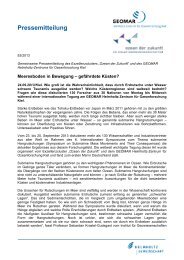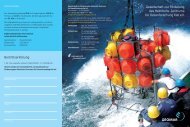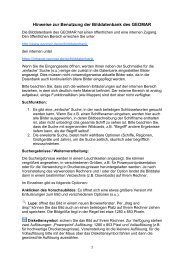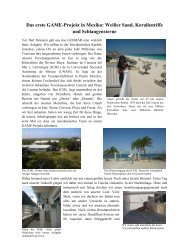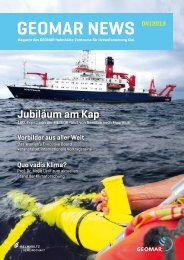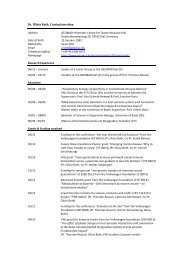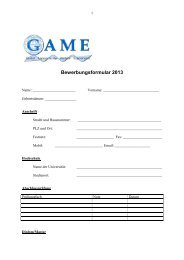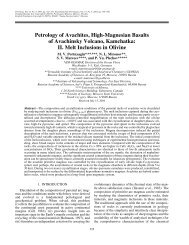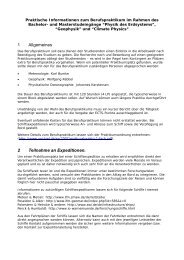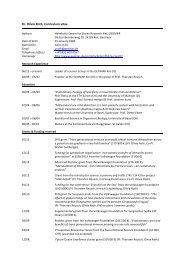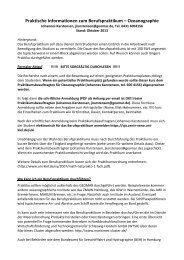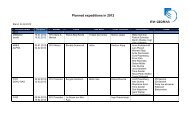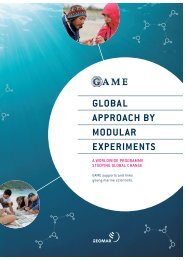IFM-GEOMAR Annual Report 2011 Appendices
IFM-GEOMAR Annual Report 2011 Appendices
IFM-GEOMAR Annual Report 2011 Appendices
You also want an ePaper? Increase the reach of your titles
YUMPU automatically turns print PDFs into web optimized ePapers that Google loves.
1. Management & Organization<br />
1.1 <strong>IFM</strong>-<strong>GEOMAR</strong> Overview<br />
The Leibniz Institute of Marine Sciences<br />
at the Kiel University (<strong>IFM</strong>-<strong>GEOMAR</strong>) was<br />
founded January 1, 2004 through a merger<br />
of the former Institute for Marine Research<br />
(IfM) and the <strong>GEOMAR</strong> Research Centre for<br />
Marine Geosciences.<br />
The mission of <strong>IFM</strong>-<strong>GEOMAR</strong> is to investigate<br />
the physical, chemical, biological,<br />
and geological processes in the ocean<br />
and their interaction with the seafloor<br />
and the atmosphere.<br />
<strong>IFM</strong>-<strong>GEOMAR</strong> has identified four overarching<br />
research themes:<br />
• Role of the Ocean in Climate Change<br />
• Human Impact on Marine Ecosystems<br />
• Living and Non-Living Marine Resources<br />
• Plate Tectonic Processes and Geological<br />
Hazards.<br />
The research topics are grouped in four areas:<br />
Ocean Circulation and Climate Dynamics,<br />
Marine Biogeochemistry, Marine Ecology, and<br />
Dynamics of the Ocean Floor. In addition,<br />
there are two major interdisciplinary Collaborative<br />
Research Centres (SFBs) funded<br />
by the German Science Foundation (DFG).<br />
The institute is an independent foundation<br />
under public law, supervised by a “Board of<br />
Governors” which consists of representatives<br />
of State and Federal Governments, the Kiel<br />
University, a representative from another research<br />
institution, a representative from pri-<br />
vate industry and the chairman of the institute’s<br />
Scientific Advisory Board (SAB). The<br />
SAB of <strong>IFM</strong>-<strong>GEOMAR</strong> is an internationally<br />
constituted advisory group with leading scientists<br />
representing all major research disciplines<br />
found at the institute. An overview of<br />
the organizational structure of the institute<br />
is shown in Figure 1 (page 4). By the end of<br />
<strong>2011</strong>, <strong>IFM</strong>-<strong>GEOMAR</strong> had about 764 employees,<br />
including 383 scientists and 381 service<br />
and technical staff (incl. student assistance).<br />
About 306 scientists and 242 service and<br />
technical staff were funded through research<br />
grants.<br />
The Leibniz Institute of Marine Sciences is<br />
associated with the Kiel University through<br />
a cooperation agreement and contributes<br />
substantially to undergraduate and graduate<br />
teaching in the following fields: Bachelor in<br />
“Physics of the Earth System: Oceanography<br />
- Meteorology - Geophysics”, Master in<br />
“Climate Physics: Meteorology and Physical<br />
Oceanography”, Master in “Biological Oceanography”,<br />
and contributions to other courses<br />
in Geosciences at Kiel University.<br />
The involvement of master, diploma and<br />
Ph.D. students in research projects is an important<br />
element of <strong>IFM</strong>-<strong>GEOMAR</strong> research.<br />
The total number of students at <strong>IFM</strong>-GEO-<br />
MAR is currently about 300. Through training<br />
of students and young scientists from<br />
foreign countries, the institute has contributed<br />
significantly to the development of<br />
<strong>Appendices</strong><br />
infrastructures for marine science in many<br />
regions of the world. Several international<br />
study programmes have been implemented<br />
in recent years.<br />
Much of the institute’s research work contributes<br />
to international research efforts<br />
such as the World Climate Research Programme<br />
(WCRP), the International Geosphere-Biosphere<br />
Programme (IGBP) or<br />
the Integrated Ocean Drilling Programme<br />
(IODP). Emphasis is on a better understanding<br />
of the ocean’s past and present role for<br />
climate variations and air-sea interactions,<br />
the role of biogeochemical transport and<br />
transformations in global change, the response<br />
and sensitivity of marine ecosystems<br />
to external forcing, gas hydrate research<br />
and risk assessment of natural hazards due<br />
to plate tectonics.<br />
<strong>IFM</strong>-<strong>GEOMAR</strong> scientists have a long tradition<br />
of participating in national and international<br />
planning and management of large-scale<br />
inter-disciplinary research programs. This<br />
includes programmes such as CLIVAR (Climate<br />
Variability and Predictability), BALTEX<br />
(Baltic Sea Experiment), SOLAS (Surface<br />
Ocean Lower Atmosphere), GLOBEC (Global<br />
Ocean Ecosystems Dynamics), IODP, Interridge,<br />
and others.<br />
The scientific work of <strong>IFM</strong>-<strong>GEOMAR</strong> could<br />
not have been maintained without funding<br />
of peer-reviewed proposals through the Ger-<br />
- <strong>IFM</strong>-<strong>GEOMAR</strong> <strong>Report</strong> <strong>2011</strong> - 1<br />
<strong>Appendices</strong>



